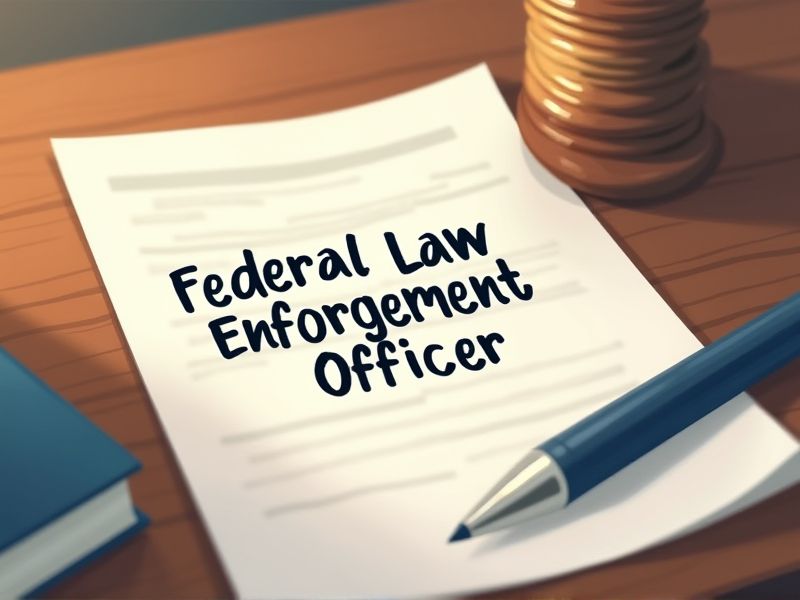
Federal Law Enforcement Officers face complex and diverse challenges, necessitating a specialized skill set to effectively uphold national security and public safety. Certifications provide standardized training and knowledge, ensuring officers are proficient in areas such as criminal investigations, cybercrime, and counterterrorism. Without these certifications, officers may lack the expertise essential for responding to evolving threats and legal requirements. Consider the following important certifications that may be needed for a career as a Federal Law Enforcement Officer.
FLETC Basic Law Enforcement Training Certification
FLETC Basic Law Enforcement Training Certification standardizes essential skills and knowledge across federal agencies, ensuring all officers have a uniform foundation. By centralizing training, FLETC enhances inter-agency collaboration and communication, as officers share consistent procedures and protocols. Certification validates the officer's competence in core areas like legal education, physical training, and firearms handling, which are crucial for job performance. Being certified increases public trust, as citizens feel assured that certified officers have undergone comprehensive professional development essential for federal duties.
FLETC Advanced Law Enforcement Techniques Certification
The FLETC Advanced Law Enforcement Techniques Certification equips federal law enforcement officers with essential skills to handle complex and evolving criminal activities. Training enhances officers' critical thinking and decision-making capabilities, vital for high-stakes situations. Certification ensures adherence to best practices and legal protocols, promoting uniformity across federal agencies. It demonstrates an officer's commitment to professional development, bolstering credibility and trust within the law enforcement community.
Firearms Proficiency Certification
Firearms Proficiency Certification ensures federal law enforcement officers possess the necessary skills to handle weapons safely and effectively, reducing the risk of accidental discharges. Proficient use of firearms can lead to improved decision-making in high-stress situations, potentially decreasing unwarranted use of force. Consistent certification processes allow for the identification and mitigation of skill gaps, contributing to overall officer readiness. Standardized training across federal agencies promotes a cohesive operational standard, fostering public confidence in law enforcement capabilities.
Defensive Tactics and Use of Force Certification
Defensive Tactics and Use of Force Certification is necessary for Federal Law Enforcement Officers to ensure they apply appropriate force under legal and ethical standards. Proper training minimizes the risk of excessive force incidents, leading to enhanced public trust. Certification facilitates consistent application of policies across federal agencies, promoting operational uniformity. More effectively managed confrontational situations result in improved officer and public safety.
Crisis Intervention Team (CIT) Certification
Crisis Intervention Team (CIT) Certification equips federal law enforcement officers with skills to effectively manage situations involving individuals experiencing mental health crises. Officers who undergo CIT training are statistically shown to reduce the likelihood of adverse incidents, such as the use of force, by applying de-escalation techniques. The certification fosters stronger community relations because trained officers are perceived as more empathetic and knowledgeable in handling sensitive circumstances. Data indicates that CIT-trained officers often connect individuals to appropriate mental health resources, reducing recidivism and easing the burden on the criminal justice system.
Emergency Vehicle Operator Course (EVOC) Certification
Federal Law Enforcement Officers face high-pressure situations where quick, decisive driving can prevent accidents and ensure public safety. The Emergency Vehicle Operator Course (EVOC) Certification equips them with advanced skills to handle emergency vehicles efficiently. This training reduces the likelihood of vehicle-related incidents that could endanger officers and civilians. Ensuring officers are EVOC certified fosters public trust in their ability to protect and serve during emergencies.
Defensive Driving Certification
A Defensive Driving Certification equips federal law enforcement officers with the skills to anticipate and respond to potential road hazards, reducing the likelihood of accidents. This training enhances their ability to operate vehicles safely, which is crucial during high-pressure situations that demand quick, precise actions. Possessing this certification often aligns with agency policies that prioritize the safety of officers and the public. It can also lessen liability risks for federal law enforcement agencies by ensuring officers are trained to handle various driving scenarios safely.
First Aid/CPR Certification
Federal law enforcement officers often encounter emergency situations, increasing the need for First Aid/CPR certification to effectively respond to medical crises. Proper training equips them with life-saving skills that can stabilize a victim before paramedics arrive. Legal obligations often require officers to act within their capacity to ensure the safety of the public, reinforcing the necessity of such certification. Having this knowledge can reduce liability and enhance the credibility of law enforcement agencies in their effort to protect and serve.
Advanced Interview and Interrogation Techniques Certification
Advanced Interview and Interrogation Techniques Certification enhances federal law enforcement officers' ability to extract factual information from suspects and witnesses, reducing the risk of false confessions. Mastery in these techniques ensures adherence to legal standards and reduces potential liability during litigation. Effective interrogation skills can lead to swifter case resolutions, bolstering the justice system's efficiency. Continuous professional development through such certifications keeps officers updated on best practices and evolving methodologies.
Cybersecurity Fundamentals Certification
Cybersecurity Fundamentals Certification ensures federal law enforcement officers are equipped with the essential knowledge to protect sensitive digital information, reducing potential breaches. As cyber threats continuously evolve, having certified officers enhances an agency's ability to anticipate, detect, and mitigate these risks efficiently. With the increasing reliance on technology in criminal investigations, officers need to understand digital forensic techniques critical for evidence gathering and legal processes. Certification fosters a workforce that can effectively collaborate with tech experts and other agencies, ensuring comprehensive national security efforts.
Summary
As a reader, when Federal Law Enforcement Officers obtain specialized certifications, you can expect enhanced competency and professionalism in handling complex cases. This results in a boost in public trust and reliability as officers demonstrate higher levels of expertise. The expanding skill set also enables them to address emerging criminal tactics more effectively. Consequently, agencies can experience improved operational efficiency and inter-agency collaboration.
